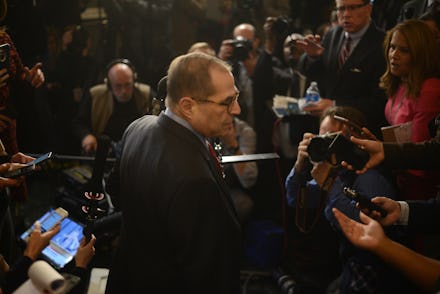The House impeachment report accuses Trump of wire fraud and criminal bribery

The House Judiciary Committee has released a 169-page report laying out arguments and evidence for its case that President Trump should be impeached and removed from office. The impeachment report is the precursor to the House Rules Committee formally considering the articles of impeachment on Tuesday, with a full vote expected Wednesday on the House floor.
The report argues that the president committed wire fraud and criminal bribery, filing these “multiple federal crimes,” as they’re described in the document, under a single article of impeachment, abuse of power. The other article is for obstruction of Congress.
“Although President Trump’s actions need not rise to the level of a criminal violation to justify impeachment, his conduct here was criminal,” argues the report, written by the Democrats on the House Judiciary Committee, led by Chairman Jerry Nadler (D-N.Y.). It asserts that Trump “betrayed the people of this nation” with behavior “both constitutional and criminal in character,” and should therefore be removed from the presidency.
“It's a strong case,” Stanford Law Professor David Sklansky, a former federal prosecutor, tells Mic. “There's quite a bit of evidence that the president held up aid and held up a White House meeting to pressure the Ukrainians to launch investigations that he thought would be politically advantageous to him. That's the abuse of power count.”
The committee’s Republicans presented an 18-page dissent written by Georgia Rep. Doug Collins, the ranking member, which made the case that Trump isn’t facing the same kind of evidence that President Richard Nixon faced.
“If President Nixon’s impeachment proceedings are the ‘gold standard’ for presidential impeachment inquiries, these proceedings, in stark contrast, will go down in history as the quintessential example of how such proceedings should not be conducted,” Collins writes, specifically taking issue with the standard of evidence used against Trump.
But impeachment has been widely interpreted by both legal scholars and previous sessions of Congress to be a valid check on presidential power, even in regard to actions that don’t necessarily rise to a criminal level. This same standard was in place for the impeachment trials of both Nixon and President Bill Clinton, Sklansky says.
“The broad consensus that members of Congress of both parties largely shared in both of those cases was that an impeachable offense doesn’t have to be something that could be prosecuted in a criminal court, it has to be a serious abuse of power,” he argues. “I think the Democrats have put together a remarkably strong case that that in fact happened here.”
The House panel makes a similar argument. “The Framers were not fools. They authorized impeachment for a reason, and that reason would have been gutted if impeachment were limited to crimes,” the report states.
The report lays out in voluminous detail the evidence that has been gathered regarding Trump’s various apparent attempts to solicit foreign interference in the U.S. democratic process. The committee establishes a pattern that stretches from 2016, when Trump “welcom[ed]” Russian interference with his infamous “Russia, if you’re listening … ” comment, up until the allegations that he pressured President Volodymyr Zelensky of Ukraine to investigate Vice President Joe Biden over the summer by holding up military aid that had already been appropriated by Congress. The report even mentions Rudy Giuliani, the president’s personal lawyer, and his travels to Ukraine as recently as last week as proof that Trump hasn’t stopped trying to solicit politically beneficial favors from that country. This is evidence, according to the Democrats, that Trump poses a “continuing threat if left in office.”
The Judiciary Committee emphasizes that simply asking Zelensky to investigate Biden would warrant impeachment, because it’s asking a foreign country to interfere in an election. But the fact that Trump withheld a visit to the Oval Office sought by Zelensky, as well as froze $391 million in military aid to Ukraine despite objections from high-ranking officials at the State Department, Pentagon, and National Security Council, adds an “aggravating factor” to the case, per the report.
According to the report, the leveraging of official state business constitutes a solicitation of a criminal bribe, as Trump used the power of his office to compel a result that was politically favorable to him.
“As a former prosecutor,” observes Sklansky, “this evidence is vastly stronger than in any public corruption case I’ve ever seen.”
The committee report alleges specifically that Trump committed wire fraud, both in reference to the July 25 phone call with Zelensky as well as the phone call the following day with U.S. Ambassador Gordon Sondland. These “foreign wire communications” were done “in furtherance of an ongoing bribery scheme,” the report stated. Wire fraud broadly means using mail or electronic communications to carry out a fraud; by calling Zelensky and Sondland, Trump allegedly moved his behavior into this criminal territory. Wire fraud carries a potential 20-year term in prison, which the report notes.
The report’s conclusions are relatively straightforward and damning: Trump has acted in his own self-interest to the detriment of the country, the panel’s Democrats argue. “Fundamentally, the president has deprived the American people of the honorable stewardship that the nation expects and demands of its chief executive," the report concludes. “President Trump has made it clear that he believes he is free to use his presidential powers the same way, to the same ends, whenever and wherever he pleases.”